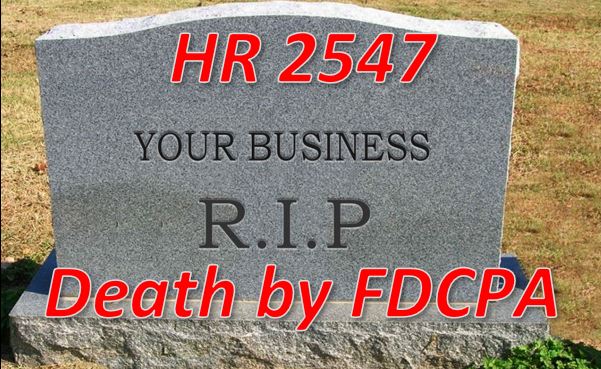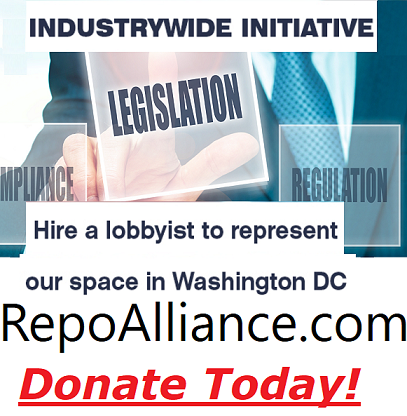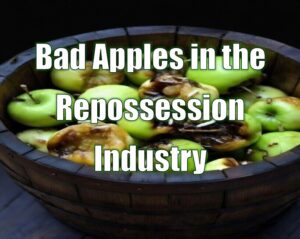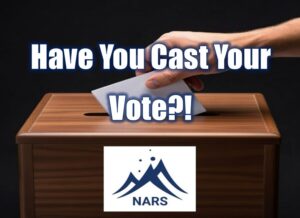Bill Seeks to Place Repossession Activity Under the FDCPA
EDITORIAL
In March of 2019, the Supreme Court took up the case of Obduskey v. McCarthy and Holthus LLP and unanimously voted that “an entity performing a nonjudicial foreclosure is not generally a “debt collector” under the FDCPA and, thus, cannot be held liable under the statute,”. H.R. 2547, the Comprehensive Debt Collection Improvement Act, seeks to unwind that decision and apply the draconian confines of the Fair Debt Collections Practices Act (FDCPA) to the repossession industry. The ramifications of which, would be devastating to not only the repossession industry, but the American economy and the entire auto industry.
While different activities in form of process, the non-judicial foreclosure and repossession processes are very similar. Taking the word foreclosure from the Supreme Court ruling and replacing it with repossession and you can easily see that this statement holds the same value to non-judicial repossessions. This is the current legal statute that protects the repossession industry from having to comply with a nearly impossible set of restraints posed by the FDCPA.
Within the FDCPA (15 USC 1692a(6)) are definitions of what a debt collector is not;
(F) any person collecting or attempting to collect any debt owed or due or asserted to be owed or due another to the extent such activity (i) is incidental to a bona fide fiduciary obligation or a bona fide escrow arrangement.
The Obduskey v. McCarthy decision agreed that non-judicial foreclosure was covered under this in that the action was considered incidental to a bona fide fiduciary obligation or a bona fide escrow arrangement and not an actual act of collecting a debt.
Incidental defined; /ˌinsəˈden(t)l/ – adjective; “liable to happen as a consequence of (an activity).”
A repossession is a consequence of the activity of non-payment. As such, non-judicial repossession activity is incidental to a bona fide fiduciary obligation (auto loan contract.)
Title VIII of H.R. 2547, submitted by Rep. Jake Auchincloss (D-MA); titled “Non-Judicial Foreclosure Debt Collection Clarification Act” is the specific section of this massive bill that is attempting to rewrite 15 USC 1692a(6) of the Fair Debt Collections Practices Act. This two-sentence Title states;
SEC. 801. SHORT TITLE.
This title may be cited as the “Non-Judicial Foreclosure Debt Collection Clarification Act”.
SEC. 802. ENFORCEMENT OF SECURITY INTERESTS.
Section 803(6) of the Fair Debt Collection Practices Act (15 U.S.C. 1692a(6)) is further amended by striking “For the purpose of section 808(6), such term also includes any person who uses any instrumentality of interstate commerce or the mails in any business the principal purpose of which is the enforcement of security interests.”.
In not one, but two sections of this economy killing bill, the clear line between collector and repossessor is under attack.
Title VI – Stop Debt Collection Abuse Act Originally introduced by “Squad” member Rep. Ayanna Pressley as H.R. 1657, also (D-MA),
“(5) The term ‘debt’ means any obligation or alleged obligation of a consumer—
“(C) which is secured by real or personal property that is used or was obtained primarily for personal, family, or household purposes, where such property is subject to forfeiture or repossession upon nonpayment of the obligation or alleged obligation.
The enforcement of a debt described in subparagraph (C) is deemed to be a collection of a debt.”; and
(C) by amending clause (vi), as so redesignated, to read as follows:
“(vi) any person collecting or attempting to collect any debt owed or due or asserted to be owed or due another to the extent such activity—
“(I) is incidental to a bona fide fiduciary obligation or a bona fide escrow arrangement;
The affect of required compliance with the FDCPA by the repossession industry looks like a mine field of litigation with every step and turn of operations.
Under a new classification as debt collectors, repossession agents would be required to notify debtors in writing of; the amount of debt owed, who the assigning lender/creditor is and provide specific instructions to the contesting of the debt in question.
The mere act of being witnessed repossessing collateral by a third party could be grounds for an FDCPA lawsuit for “third-party disclosure” violations.
A “Mini-Miranda” notice containing specific language identifying the repossessor as a debt collector would need to be provided with each contact.
Even accidental contact with a borrower during a repossession after 9PM and before 8AM would be an FDCPA violation.
Any accidental slip of the tongue could trigger claims of the use of profane or abusive language and be the source of FDCPA violations.
The devastating implications of this bill are not only obvious to both the collections and repossession industries but have also caught the attention of many national trade organizations who have made their opposition as clear.
In an April 20 letter to the House Financial Services Committee, the Credit Union National Association (CUNA) wrote, “This provision will expose mortgage servicers to increased FDCPA liability and produce regulatory compliance challenges for entities enforcing security interests.”
CUNA was also in alliance with their own arch-nemesis, The American Bankers Association (ABA), Consumer Bankers Association (CBA), Independent Community Bankers of America (ICBA), Mortgage Bankers Association (MBA), National Association of Federally-Insured Credit Unions (NAFCU), Securities Industry and Financial Markets Association (SIFMA) and the U.S. Chamber of Commerce (COC) in a joint letter sent to congress on May 11 that stated;
“ the undersigned organizations are opposed to Title VIII of H.R. 2547, the Non-Judicial Foreclosure Debt Collection Clarification Act, which would reverse the unanimous Supreme Court of the United States (SCOTUS) decision from March 20, 2019 in Obduskey v. McCarthy and Holthus LLP (“Obduskey”). In Obduskey, SCOTUS clarified that entities enforcing a security interest without also seeking repayment or deficiency judgment generally do not qualify as debt collectors under the Fair Debt Collection Practices Act (FDCPA).”
Despite all of this unified opposition, Congress passed H.R. 2547 with a vote of 215 to 207, almost completely along party lines with only on Democrat voting against it. Make no mistake, H.R. 2547 is not only a credit killer, it would nearly destroy self-help repossession and set up all recovery agencies across the nation for FDCPA lawsuits with each and every recovery. Your support to stop the bill are urgently needed.
Having cleared Congress, this Bill, and its smaller Bills that it is made up of, are currently under review in the Senate. While infrastructure Bills appear to be dominating the Senate’s time, these Bills are still on the table. It’s easy to dismiss such threats as impossible, but after a year like 2020, the bar for the conditions of possibility is lower than before.
Please contact your local state Senators and urge them to vote against this economy killing madness. At the same time, we urge you to donate to the RepoAlliance so that their lobbying efforts to protect the repossession industry and the American economy.
Kevin Armstrong
Editor












More Stories
Bad Apples in the Repossession Industry
Why Self-Help Repossession Is Taken for Granted — and Why Losing It Would Hurt Consumers Most
A Necessary Distinction: Financial Oversight vs. Financial Control
When Oversight Becomes Overreach: Why Demanding Subcontractor Financials Is Wrong
Snitching vs. Standing on Principle: Calling Out Bad Actors in the Repossession Industry
Lender Interference in Georgia Repossessions